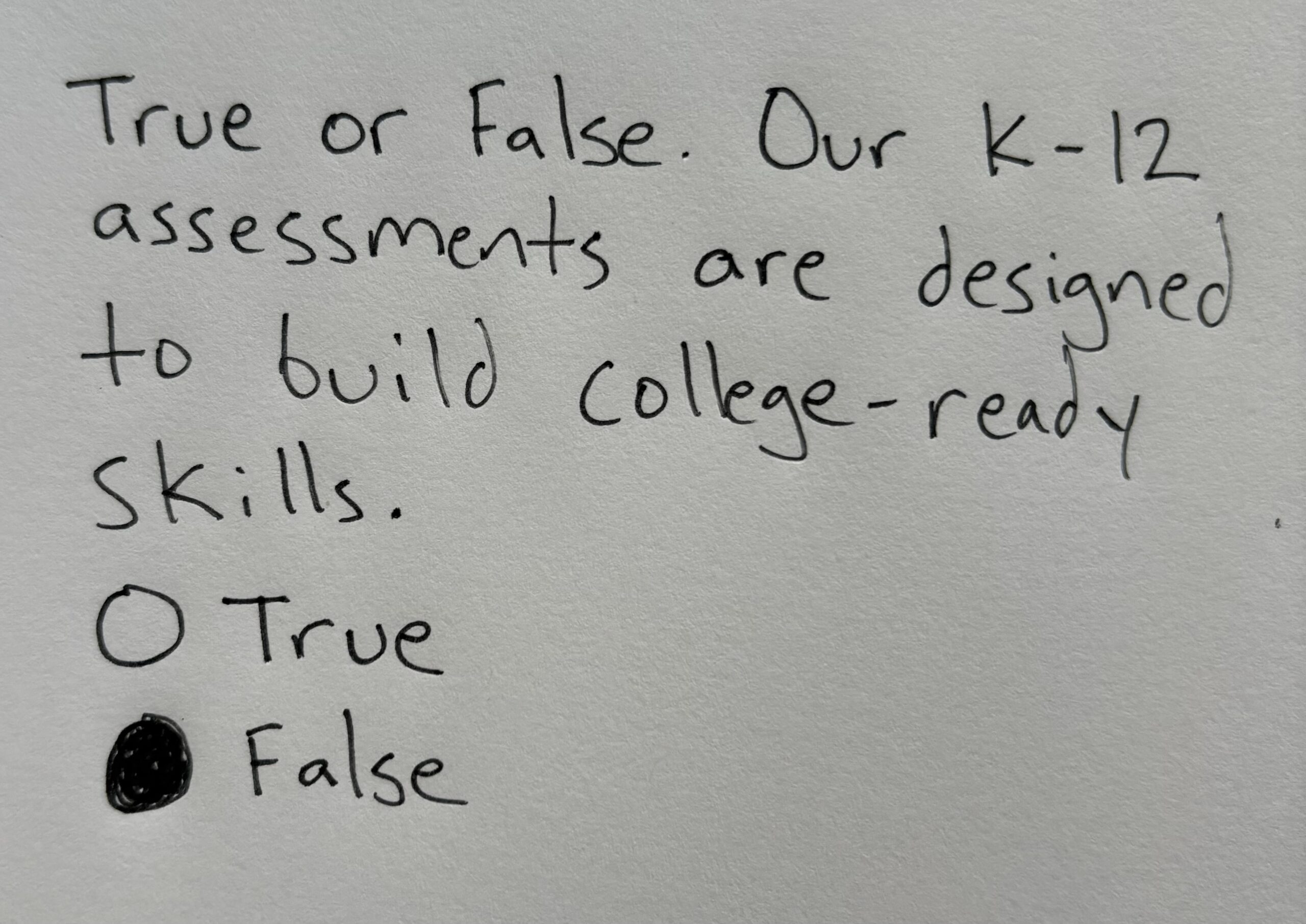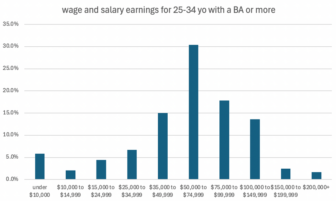Over the next several weeks, I’ll be writing a series of posts about the importance of educational attainment – both to our statewide economy and to individual economic mobility and prosperity – and how we should be designing our K-16 education system to increase the number of Michiganders who attain bachelor’s degrees.
This is the seventh post in the series. See links to previous posts below:
Post #1: Educational attainment and economic development
Post #2: Educational attainment and economic well-being
Post #3: College completion rates
Post #4: Beyond free college
Post #5: Developing writers in K-12
Post #6: Building college-ready skills in K-12
In my last two posts I outlined a set of knowledge, behaviors, mindsets, and skills that are critical to college success, but that are not actively developed in our K-12 education system. Chief among these is the ability to write (and therefore think) critically, analytically, and clearly. But in addition, in order to succeed in college students must also be able to learn independently, which requires them to deploy key cognitive strategies (e.g., formulate problems, construct arguments), possess a strong foundation of knowledge and key concepts across content areas, and exhibit a set of academic behaviors and contextual skills needed to learn new content.
These capacities are not actively developed in our K-12 system because the assessments on which students, teachers, and schools are judged do not require students to develop these capacities.
I mentioned in my last post that in the book In Search of Deeper Learning, education scholars Jal Mehta and Sarah Fine see evidence of what they call “deeper learning” – a kind of learning in which students build a deep understanding of the concepts that make up the domains they are studying, and that asks them to not only consume but produce knowledge – only in private college-prep schools or in elective and extracurricular courses in traditional public schools. What all these settings have in common is that teachers are for the most part free from the strictures of standardized tests and mandated curricula. Mehta and Fine argue that this is not a coincidence.
Traditional K-12 assessments inhibit college readiness
There are only so many hours in the day, and the more time spent preparing students for the kinds of material they will face on a standardized test, the less time is available for active inquiry and discovery-based pedagogy, learning how to build an argument, building deep conceptual knowledge, and developing the ability to articulate one’s thoughts clearly and logically in writing. The nature of high-stakes tests (multiple choice responses; limited, if any, opportunities for writing) and the type of teaching they encourage has resulted in students only looking for the “right” answer, and only attempting to learn material that will be “on the test.” This is troubling. In college courses, and much more so in the world of work, there is rarely one right answer, and those who are learners – who seek out new material because of genuine curiosity, rather than the chance they may one day be assessed on it – are those who thrive.
There are many different places we can and should intervene to create a K-12 education system that equips students with the knowledge, skills, mindsets, and behaviors needed to be successful in college and career. But a good place to start is in redesigning our K-12 accountability systems.
A K-12 accountability system built around college success
In a 2014 report, Marc Tucker of the National Center for Education and the Economy made an attempt to define the contours of an accountability system that was built around deep learning and intellectually ambitious tasks. We believe the proposed system Tucker outlines remains one of the best examples of what a comprehensive overhaul of our accountability system might look like. Rather than annual high-stakes standardized tests that every student takes, Tucker advocates for just three “census” exams through a student’s K-12 career – one in fourth grade, one before high school, and one after a student’s sophomore year of high school. And while today’s high-stakes standardized tests are focused primarily on multiple choice questions assessing basic math and literacy skills, the tests Tucker is proposing would consist of “performance items” such as extended essays, “designed to assess both the kinds of skills traditionally associated with the academic disciplines” as well as “21st century skills.” Whereas today’s assessments are cheap to produce and grade, Tucker notes that these new assessments “would be expensive and time-consuming to develop and administer, and they should be.” In Tucker’s model, these three census assessments would be accompanied by multiple-choice tests focused on basic math and literacy skills that would still be administered annually, though only to samples of the student population, to get a regular check on the performance of a given state, district, or school. Tucker’s design envisions using the data from both the census and sampling exams to identify schools that need support, and then deploying teams of expert educators to provide that support.
It’s worth noting that many schools and educational models that we would consider exemplars of a college preparatory environment already use some version of the system Tucker proposes. At many private college-prep schools, the academic program, particularly in the later years of high school, might center around a thesis project or another long-term research project, that mimics the kind of work students may regularly face in college and career. In the International Baccalaureate program (IB) – an academic program that high schools can implement to ensure a level of rigor needed to adequately prepare students to succeed in college – students must complete an extended essay: a 4,000 word research paper about a topic of interest to them, that centers on the ability to formulate a research question, engage in deep research, develop an argument, and communicate ideas. And at New York’s “Performance Standards Consortium” schools, instead of taking New York’s Regents exams students submit “performance assessments” to external evaluators, which might include “analytical essays on literature, social studies research papers, extended or original science experiments, and problem-solving at the higher levels of mathematics.” In recent research on the performance of New York City high schools, these consortium schools stood out for their success in “getting graduates into college – and the success of their students once they are in college.” It’s also worth noting that Tucker’s proposed testing regime is much closer to the kinds of testing protocols seen in high-performing countries.
In short, one small step towards an accountability system that intentionally tries to build the capacities needed for college success would be to utilize performance items – such as the kinds of analytical essays and research papers students will be asked to execute regularly in college. Such assessments would likely present a starker image of just how unprepared our young people are for a world that values critical thinking and clarity of communication. But by using these kinds of performance items as the north star of our education system – rather than formulaic and intellectually shallow multiple-choice tests – we can begin the long journey of better preparing our young people for the world in which they are heading.
In my next post I’ll dig into a second way in which our accountability system can center the capacities needed for college success – by holding the K-12 system accountable for how well their students do in college.







